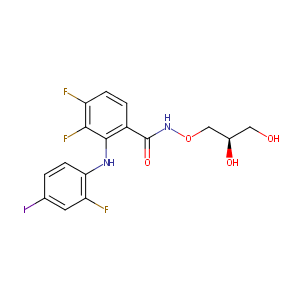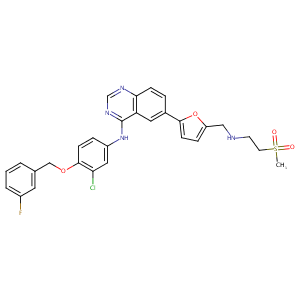| DOT Name |
DOT ID |
UniProt ID |
Mode of Action |
REF |
|
Cytochrome P450 3A4 (CYP3A4)
|
OTQGYY83
|
CP3A4_HUMAN
|
Increases Expression
|
[7] |
|
Cytochrome P450 3A5 (CYP3A5)
|
OTSXFBXB
|
CP3A5_HUMAN
|
Increases Expression
|
[7] |
|
Cytochrome P450 3A7 (CYP3A7)
|
OTTCDHHM
|
CP3A7_HUMAN
|
Increases Expression
|
[7] |
|
Nuclear receptor subfamily 0 group B member 2 (NR0B2)
|
OT7UVICX
|
NR0B2_HUMAN
|
Decreases Expression
|
[7] |
|
Toll-like receptor 4 (TLR4)
|
OTP7ML3S
|
TLR4_HUMAN
|
Decreases Expression
|
[5] |
|
Neuropilin-1 (NRP1)
|
OTCGULYV
|
NRP1_HUMAN
|
Decreases Expression
|
[5] |
|
T-box transcription factor TBX3 (TBX3)
|
OTM64N7K
|
TBX3_HUMAN
|
Decreases Expression
|
[5] |
|
Protein sprouty homolog 2 (SPRY2)
|
OTH0CRCZ
|
SPY2_HUMAN
|
Decreases Expression
|
[5] |
|
Leupaxin (LPXN)
|
OTUNV3CK
|
LPXN_HUMAN
|
Decreases Expression
|
[5] |
|
PR domain zinc finger protein 1 (PRDM1)
|
OTQLSVBS
|
PRDM1_HUMAN
|
Decreases Expression
|
[5] |
|
Slit homolog 2 protein (SLIT2)
|
OTLS2RJ4
|
SLIT2_HUMAN
|
Decreases Expression
|
[5] |
|
Tumor necrosis factor ligand superfamily member 15 (TNFSF15)
|
OTNGA2BW
|
TNF15_HUMAN
|
Decreases Expression
|
[5] |
|
Integrin beta-like protein 1 (ITGBL1)
|
OTJDHE17
|
ITGBL_HUMAN
|
Decreases Expression
|
[5] |
|
Urokinase-type plasminogen activator (PLAU)
|
OTX0QGKK
|
UROK_HUMAN
|
Decreases Expression
|
[5] |
|
Interleukin-1 beta (IL1B)
|
OT0DWXXB
|
IL1B_HUMAN
|
Decreases Expression
|
[5] |
|
Interstitial collagenase (MMP1)
|
OTI4I2V1
|
MMP1_HUMAN
|
Decreases Expression
|
[5] |
|
Glycophorin-C (GYPC)
|
OTOEDR7O
|
GLPC_HUMAN
|
Decreases Expression
|
[5] |
|
Growth-regulated alpha protein (CXCL1)
|
OT3WCTZV
|
GROA_HUMAN
|
Decreases Expression
|
[5] |
|
Interleukin-8 (CXCL8)
|
OTS7T5VH
|
IL8_HUMAN
|
Decreases Expression
|
[5] |
|
Tissue factor pathway inhibitor (TFPI)
|
OTA0FX16
|
TFPI1_HUMAN
|
Decreases Expression
|
[5] |
|
Mast/stem cell growth factor receptor Kit (KIT)
|
OTHUY3VZ
|
KIT_HUMAN
|
Decreases Expression
|
[5] |
|
Aminopeptidase N (ANPEP)
|
OTP3WYFD
|
AMPN_HUMAN
|
Decreases Expression
|
[5] |
|
Integrin alpha-2 (ITGA2)
|
OTPFL017
|
ITA2_HUMAN
|
Decreases Expression
|
[5] |
|
Protein-glutamine gamma-glutamyltransferase 2 (TGM2)
|
OT6MFOWF
|
TGM2_HUMAN
|
Decreases Expression
|
[5] |
|
Pentraxin-related protein PTX3 (PTX3)
|
OTPXHRKU
|
PTX3_HUMAN
|
Decreases Expression
|
[5] |
|
5-hydroxytryptamine receptor 7 (HTR7)
|
OT44DEWB
|
5HT7R_HUMAN
|
Decreases Expression
|
[5] |
|
Glutaredoxin-1 (GLRX)
|
OT0QHTAR
|
GLRX1_HUMAN
|
Decreases Expression
|
[5] |
|
17-beta-hydroxysteroid dehydrogenase type 2 (HSD17B2)
|
OT3K7HY5
|
DHB2_HUMAN
|
Decreases Expression
|
[5] |
|
ETS translocation variant 5 (ETV5)
|
OTE2OBM4
|
ETV5_HUMAN
|
Decreases Expression
|
[5] |
|
ETS translocation variant 4 (ETV4)
|
OT8C98UZ
|
ETV4_HUMAN
|
Decreases Expression
|
[5] |
|
Transcription factor SOX-9 (SOX9)
|
OTVDJFGN
|
SOX9_HUMAN
|
Decreases Expression
|
[5] |
|
ETS translocation variant 1 (ETV1)
|
OT6PMJIK
|
ETV1_HUMAN
|
Decreases Expression
|
[5] |
|
Stanniocalcin-1 (STC1)
|
OTGVVXYF
|
STC1_HUMAN
|
Decreases Expression
|
[5] |
|
Paired mesoderm homeobox protein 1 (PRRX1)
|
OTTZK5G8
|
PRRX1_HUMAN
|
Decreases Expression
|
[5] |
|
Epithelial membrane protein 1 (EMP1)
|
OTSZHUHQ
|
EMP1_HUMAN
|
Decreases Expression
|
[5] |
|
Forkhead box protein G1 (FOXG1)
|
OTAW57J4
|
FOXG1_HUMAN
|
Decreases Expression
|
[5] |
|
ADP-ribosylation factor-like protein 4C (ARL4C)
|
OTQ3QNNU
|
ARL4C_HUMAN
|
Decreases Expression
|
[5] |
|
Reelin (RELN)
|
OTLKMW1O
|
RELN_HUMAN
|
Decreases Expression
|
[5] |
|
C-C motif chemokine 20 (CCL20)
|
OTUCJY4N
|
CCL20_HUMAN
|
Decreases Expression
|
[5] |
|
A-kinase anchor protein 12 (AKAP12)
|
OTCVRDDX
|
AKA12_HUMAN
|
Decreases Expression
|
[5] |
|
Urokinase plasminogen activator surface receptor (PLAUR)
|
OTIRKKEQ
|
UPAR_HUMAN
|
Decreases Expression
|
[5] |
|
Dual specificity protein phosphatase 4 (DUSP4)
|
OT6WAO12
|
DUS4_HUMAN
|
Decreases Expression
|
[5] |
|
Semaphorin-3A (SEMA3A)
|
OTQJSV7W
|
SEM3A_HUMAN
|
Decreases Expression
|
[5] |
|
Monocyte to macrophage differentiation factor (MMD)
|
OTB5I4OC
|
PAQRB_HUMAN
|
Decreases Expression
|
[5] |
|
Syntaxin-1A (STX1A)
|
OTSBUZB4
|
STX1A_HUMAN
|
Decreases Expression
|
[5] |
|
Dual specificity protein phosphatase 6 (DUSP6)
|
OT4H6RKW
|
DUS6_HUMAN
|
Decreases Expression
|
[5] |
|
Kinesin-like protein KIF24 (KIF24)
|
OTJTA5V3
|
KIF24_HUMAN
|
Decreases Expression
|
[5] |
|
Anoctamin-1 (ANO1)
|
OTSREUNI
|
ANO1_HUMAN
|
Decreases Expression
|
[5] |
|
NADH-cytochrome b5 reductase 2 (CYB5R2)
|
OTTLM7XN
|
NB5R2_HUMAN
|
Decreases Expression
|
[5] |
|
Dynamin-binding protein (DNMBP)
|
OTMHH14H
|
DNMBP_HUMAN
|
Decreases Expression
|
[5] |
|
Sialic acid-binding Ig-like lectin 15 (SIGLEC15)
|
OTON4K9S
|
SIG15_HUMAN
|
Decreases Expression
|
[5] |
|
UPF0606 protein KIAA1549L (KIAA1549L)
|
OT80HUVY
|
K154L_HUMAN
|
Decreases Expression
|
[5] |
|
Neuron navigator 3 (NAV3)
|
OT97M1TR
|
NAV3_HUMAN
|
Decreases Expression
|
[5] |
|
Dedicator of cytokinesis protein 4 (DOCK4)
|
OTH3XY8B
|
DOCK4_HUMAN
|
Decreases Expression
|
[5] |
|
Transmembrane protein 156 (TMEM156)
|
OTH7YJID
|
TM156_HUMAN
|
Decreases Expression
|
[5] |
|
Tribbles homolog 2 (TRIB2)
|
OTHSX3MX
|
TRIB2_HUMAN
|
Decreases Expression
|
[5] |
|
Hyaluronan synthase 2 (HAS2)
|
OTTD3PAL
|
HYAS2_HUMAN
|
Decreases Expression
|
[5] |
|
Neuronal cell adhesion molecule (NRCAM)
|
OT80HHQ2
|
NRCAM_HUMAN
|
Decreases Expression
|
[5] |
|
Discoidin, CUB and LCCL domain-containing protein 2 (DCBLD2)
|
OTB71I02
|
DCBD2_HUMAN
|
Decreases Expression
|
[5] |
|
Formin-like protein 2 (FMNL2)
|
OT9OVWCV
|
FMNL2_HUMAN
|
Decreases Expression
|
[5] |
|
Monoglyceride lipase (MGLL)
|
OT5ES4IE
|
MGLL_HUMAN
|
Decreases Expression
|
[5] |
|
Paternally-expressed gene 3 protein (PEG3)
|
OTHQW98S
|
PEG3_HUMAN
|
Decreases Expression
|
[5] |
|
Disintegrin and metalloproteinase domain-containing protein 19 (ADAM19)
|
OTH88TXU
|
ADA19_HUMAN
|
Decreases Expression
|
[5] |
|
Sodium-dependent neutral amino acid transporter B(0)AT2 (SLC6A15)
|
OTGMPVNR
|
S6A15_HUMAN
|
Decreases Expression
|
[5] |
|
Endothelial cell-specific molecule 1 (ESM1)
|
OT331Y8V
|
ESM1_HUMAN
|
Decreases Expression
|
[5] |
|
Interleukin-1 receptor accessory protein-like 1 (IL1RAPL1)
|
OTW3T4B2
|
IRPL1_HUMAN
|
Decreases Expression
|
[5] |
|
Neurotrimin (NTM)
|
OTHF0UQU
|
NTRI_HUMAN
|
Decreases Expression
|
[5] |
|
Histone deacetylase 9 (HDAC9)
|
OTO8O0LF
|
HDAC9_HUMAN
|
Decreases Expression
|
[5] |
|
Type 2 lactosamine alpha-2,3-sialyltransferase (ST3GAL6)
|
OTB17Q43
|
SIA10_HUMAN
|
Decreases Expression
|
[5] |
|
Bcl-2-like protein 11 (BCL2L11)
|
OTNQQWFJ
|
B2L11_HUMAN
|
Increases Expression
|
[8] |
|
Forkhead box protein O3 (FOXO3)
|
OTHXQG4P
|
FOXO3_HUMAN
|
Increases Expression
|
[9] |
|
Myc proto-oncogene protein (MYC)
|
OTPV5LUK
|
MYC_HUMAN
|
Decreases Expression
|
[10] |
|
DNA excision repair protein ERCC-1 (ERCC1)
|
OTNPYQHI
|
ERCC1_HUMAN
|
Decreases Expression
|
[11] |
|
Poly polymerase 1 (PARP1)
|
OT310QSG
|
PARP1_HUMAN
|
Increases Cleavage
|
[12] |
|
Fos-related antigen 1 (FOSL1)
|
OT9YTYMB
|
FOSL1_HUMAN
|
Decreases Expression
|
[13] |
|
Mitogen-activated protein kinase 3 (MAPK3)
|
OTCYKGKO
|
MK03_HUMAN
|
Decreases Phosphorylation
|
[14] |
|
Mitogen-activated protein kinase 1 (MAPK1)
|
OTH85PI5
|
MK01_HUMAN
|
Decreases Phosphorylation
|
[14] |
|
RAC-alpha serine/threonine-protein kinase (AKT1)
|
OT8H2YY7
|
AKT1_HUMAN
|
Increases Phosphorylation
|
[12] |
|
Small ribosomal subunit protein eS6 (RPS6)
|
OTT4D1LN
|
RS6_HUMAN
|
Decreases Phosphorylation
|
[15] |
|
Heat shock factor protein 1 (HSF1)
|
OTYNJ4KP
|
HSF1_HUMAN
|
Decreases Activity
|
[16] |
|
Induced myeloid leukemia cell differentiation protein Mcl-1 (MCL1)
|
OT2YYI1A
|
MCL1_HUMAN
|
Decreases Expression
|
[8] |
|
Bcl-2 homologous antagonist/killer (BAK1)
|
OTDP6ILW
|
BAK_HUMAN
|
Increases Expression
|
[12] |
|
DNA repair endonuclease XPF (ERCC4)
|
OTFIOPG1
|
XPF_HUMAN
|
Increases Expression
|
[11] |
|
Ras-related C3 botulinum toxin substrate 1 (RAC1)
|
OTKRO61U
|
RAC1_HUMAN
|
Affects Response To Substance
|
[17] |
| ------------------------------------------------------------------------------------ |
|
|
|
|


